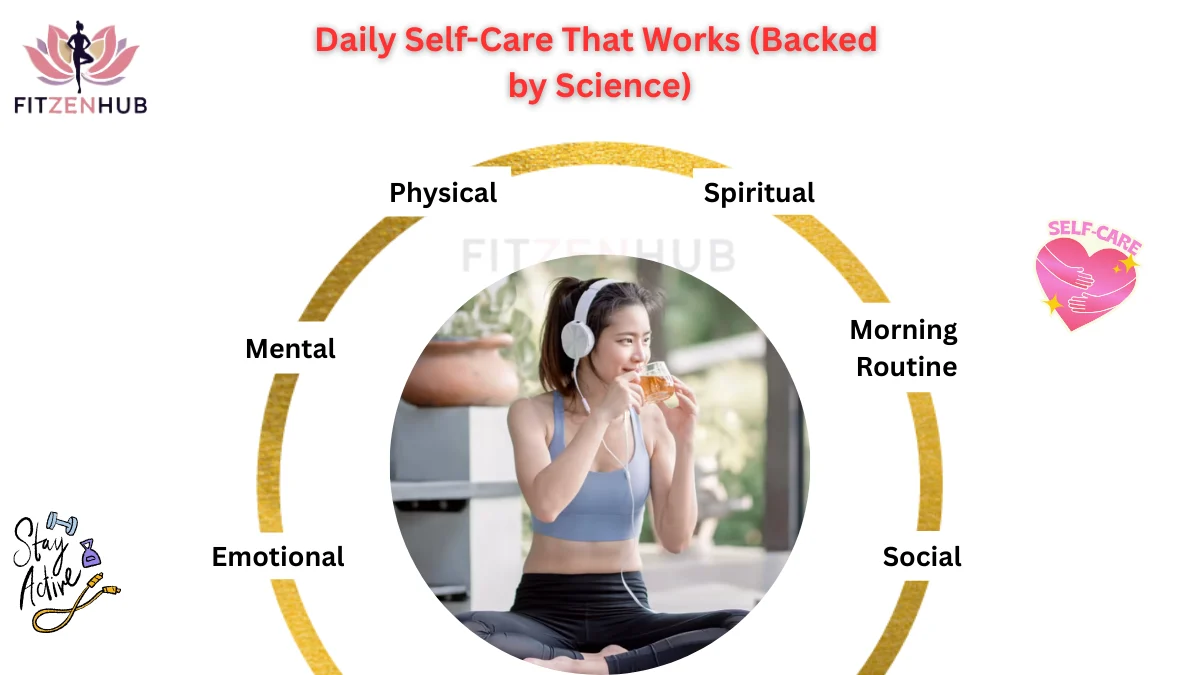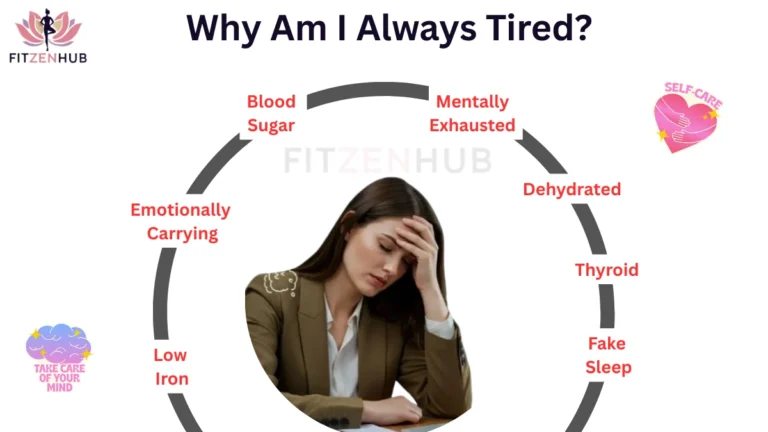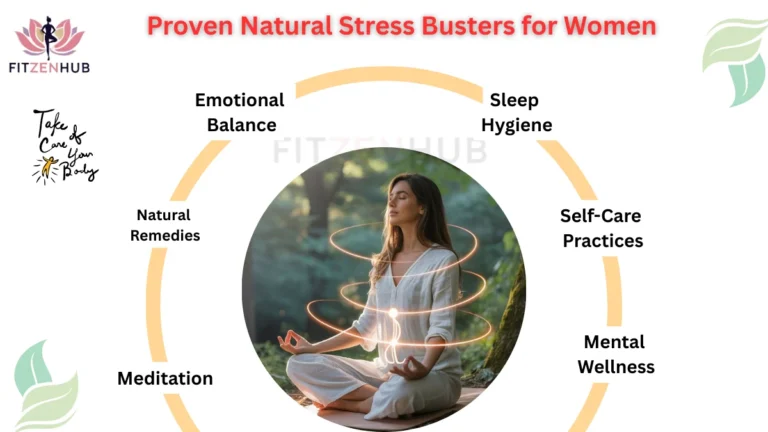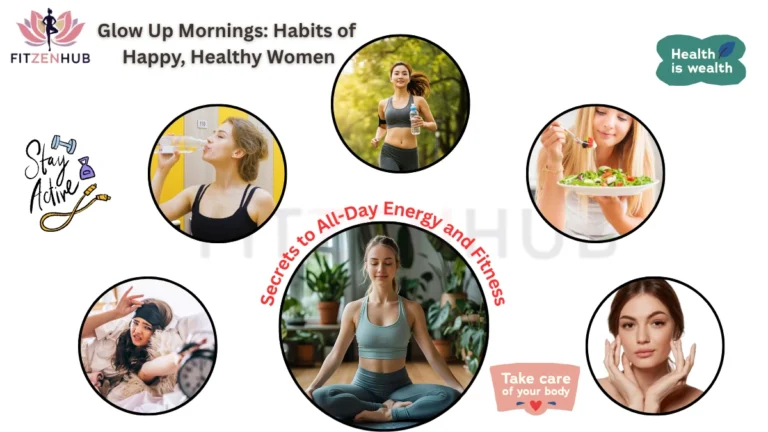Struggling to stick to self-care? Discover a science-backed daily self-care routine that actually works—no fluff, just real results for busy women. Reset your mind, body & hormones with simple habits that stick.
💬 Self-care isn’t selfish. It’s survival.
In a world where stress feels endless, deadlines are tight, and social media never sleeps, the need for a daily self-care routine has never been more urgent. But here’s the truth: most self-care advice is unrealistic. Bubble baths and face masks can’t fix burnout.
What really works? A practical, research-backed self-care plan that supports your mental, emotional, and physical well-being—every day.
In this guide, we’ll help you build a daily self-care routine that feels like you — science-based, flexible, and fulfilling.
🌱 Why Daily Self-Care Is Non-Negotiable
Self-care isn’t a luxury. According to the American Psychological Association, chronic stress is linked to anxiety, depression, insomnia, and immune system issues. Women are especially prone to burnout due to multitasking, caregiving roles, and emotional labor.
“Self-care is about creating a system that nourishes your nervous system every single day,” — Dr. Brené Brown, research professor and author.
A solid self-care routine:
- Improves mood and focus
- Enhances sleep quality
- Boosts resilience and confidence
- Prevents emotional exhaustion
- Supports hormonal and gut health
Let’s build yours step-by-step.
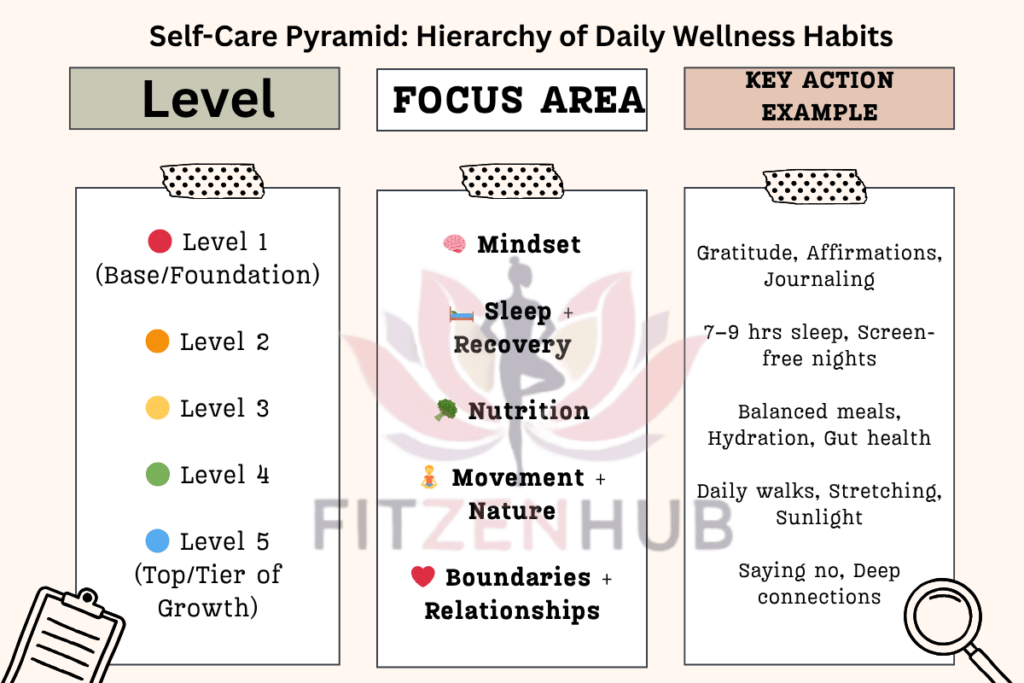
🧩 Step 1: Choose Your Self-Care Pillars
There are 5 key self-care pillars to include in your daily routine. You don’t need to hit all five every day—but having a mix is powerful.
1. Emotional Self-Care
✅ Journaling, therapy, setting boundaries
✅ Saying “no” without guilt
✅ Naming and feeling your emotions
2. Physical Self-Care
✅ Stretching, walking, nutrition, sleep
✅ Hydration and meal prepping
✅ Limiting screen time
3. Mental Self-Care
✅ Reading, meditation, unplugging
✅ Learning something new
✅ Gratitude practice
4. Social Self-Care
✅ Phone calls with friends
✅ Spending time with supportive people
✅ Asking for help
5. Spiritual Self-Care
✅ Nature walks, prayer, meditation
✅ Breathwork or journaling
✅ Acts of kindness
💡 Pro Tip: Choose 2–3 pillars to focus on daily, and rotate the rest weekly.
📋 Step 2: Morning Routine to Start With Clarity
Mornings set the tone. A simple 15–30 minute self-care ritual can drastically improve your mood and energy.
🔆 Sample Morning Self-Care Routine:
- 🌞 Wake up with sunlight (natural or light alarm)
- 🛏️ 5-minute stretch or yoga
- 📓 Gratitude journaling (3 things you’re thankful for)
- ☕ Hydrating drink before caffeine
- 📵 10-minute phone-free quiet time (or guided meditation)
🧠 Science Says: Morning journaling improves cognition and mental clarity. A 2020 study in Frontiers in Psychology found that gratitude journaling improves positive emotions and lowers cortisol.
🕓 Step 3: Midday Reset Without Guilt
Even if you work 9–5, you can integrate micro self-care breaks:
- 🌿 Step outside for 5 minutes
- 🧘 Deep belly breathing (4–4–4–4 method)
- 💧 Drink a full glass of water
- 🤳 Message a loved one
- 🎧 Listen to one feel-good song
This helps reset your nervous system, regulate blood sugar, and boost focus.
🧬 According to Harvard Health, mini breaks improve memory and prevent decision fatigue.
🌙 Step 4: Evening Routine to Wind Down
Nights are for nervous system regulation. Your evening self-care should gently release the day’s stress.
🌜 Sample Evening Self-Care Routine:
- 🍵 Herbal tea or magnesium supplement
- 📴 Shut off screens 1 hour before bed
- 📚 Read fiction or journal your thoughts
- 💆♀️ Dry brushing or warm shower
- 🛌 5-minute meditation (try body scan)
🌸 Don’t aim for perfection. One or two mindful acts are enough to tell your brain: “You are safe. You are healing.”
🧠 Therapist-Approved Self-Care Hacks
Real therapists suggest small, consistent actions over occasional grand gestures.
🧡 Dr. Julie Smith’s Tips:
- Set boundaries around your time and energy
- Practice “emotional hygiene” by labeling your feelings
- Stop doom-scrolling and read something inspiring instead
💬 Therapist Mantra:
“If it’s not sustainable, it’s not self-care—it’s self-sabotage.”
📊 Self-Care Tracker
A simple weekly self-care tracker helps you stay mindful and consistent.
| Day | Physical | Mental | Emotional | Social | Spiritual |
|---|---|---|---|---|---|
| Monday | ✅ | ✅ | ⬜ | ✅ | ⬜ |
| Tuesday | ✅ | ✅ | ✅ | ⬜ | ✅ |
| … | … | … | … | … | … |
💡 Bonus: Quick 5-Minute Self-Care Ideas
Short on time? Try these:
- ✋ 5-4-3-2-1 Grounding Technique
- 🧴 Apply your favorite hand cream slowly
- 💬 Say one kind thing to yourself
- 🌬️ 3 deep exhale-dominant breaths
- 🔄 2-minute mirror affirmation: “I’m doing my best.”
Even a few mindful minutes can rewire your day.
🧮 Self-Care Burnout Risk Score
🚫 Self-Care Myths to Ignore
❌ You need an hour for it to “count”
❌ It’s selfish to prioritize your needs
❌ You must follow rigid morning routines
✅ The truth? Your self-care routine should evolve with your life, hormones, and energy.
Also Read: Why You Wake Up Tired Every Day
📚 Sources:
- Harvard Medical School — Benefits of self-care
- National Institutes of Health — Stress and Cortisol
- Cleveland Clinic — Why Sleep is Critical
- Journal of Psychosomatic Research — Impact of journaling on stress and health outcomes
- Mayo Clinic — Daily exercise and mood benefits
💬 Final Thoughts: Your Self-Care = Your Power
You don’t need to wait for burnout to start taking care of yourself.
Your self-care isn’t a reward — it’s your daily fuel.
Your needs aren’t too much — they’re your truth.
Your mental health matters — every. single. day.
So today, start small. Take one deep breath. Drink one glass of water. Write one kind sentence to yourself. And repeat.
Because you are worth the effort.
📌 Frequently Asked Questions
Q1. How do I start a self-care routine if I have no time?
Start with 5-minute micro-routines like deep breathing, journaling, or walking. These stack over time.
Q2. Can I skip days in my routine?
Yes. Flexibility is key. Self-care should support you, not pressure you.
Q3. Is scrolling TikTok self-care?
It depends. If it makes you laugh and decompress—yes. But if it leads to comparison or anxiety—skip it.
Q4. What if I don’t have time for a full routine?
Start small. Even a 5-minute ritual like deep breathing or gratitude journaling can reduce cortisol levels and improve mood over time.
Q5. Can a self-care routine help with weight loss and energy?
Yes! A consistent routine helps regulate stress hormones (like cortisol), which play a direct role in fat storage, cravings, and fatigue.

